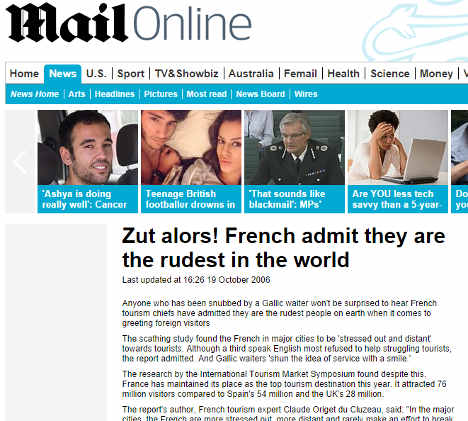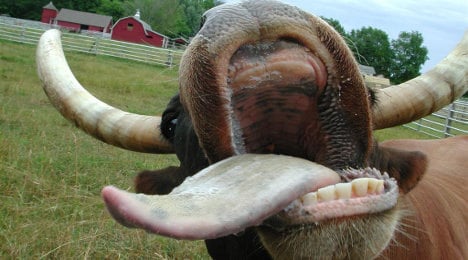'Sacre bleu!' Do the French really say that?

Do the French really say "sacre bleu!" or "zut alors!" when they want to curse? Or is it just a myth Anglos and their media have engineered? And if they don't use them then what do the French really say when they want to swear?
Every time something bad happens in France, whether the wine harvest is down or a president has been caught with his pants down you can almost be guaranteed some English news site (normally the Daily Mail), somewhere, will start their headline with the words “Sacre Bleu!”
Or if it’s not “Sacre Bleu!” (actually written "sacrebleu" in French) it will be “zut alors!” or perhaps even “Mon Dieu!”.
It seems the equivalent would be French news sites starting articles about British PM David Cameron’s beach strip and the like with the words “Golly Gosh!” or “Heavens above!”, except we don’t see that too much.
This raises the question, does anyone in France actually use terms like “Sacre Bleu”? And if not then what do the French really say when they want to express shock or air their frustrations.
We take a closer look.
Sacrebleu!
Sacrebleu is a stereotypical and very old fashioned French curse, which is rarely used by the French these days. An English equivalent would be "My Goodness!” or “Golly Gosh!” It was once considered very offensive.
It literally means "sacred blue," but it comes from "sacré Dieu" or "sacred God." "Bleu" was used by people to replace "Dieu" in order to avoid the blasphemy of explicitly using the name of God.
Even grand-parents don’t really say it anymore, but you will probably find it used in French novels from the 19th and early 20th century.
The reason the English presume all the French say sacrebleu! can perhaps be blamed on Agatha Christie’s fictional Belgian detective Hercule Poirot, who was very fond of the phrase.
Zut alors !
This is another expression you’ll probably have heard said in more English than French. It’s an old fashioned soft curse that is often translated as “darn” or “shoot”. The “alors” is added on to give it extra emphasis except it has lost its power over the years. Like “sacrebleu”, “zut alors” has pretty much disappeared, or at least among the younger generation and you’ll likely draw a few smirks or strange glances if you use it these days.
The shorter version “zut” is however used more frequently used and won’t get you into trouble.

Mon Dieu!
The “oh my god” of French is another one that seems more common in English than in French, however unlike “sacrébleu” and “zut alors”, you’ll still hear it being said in France these days, although perhaps so much not among the younger generation.
For a secular country like France, “Mon Dieu!” has proved to be a popular way of expressing anger or shock over the years, although probably not among the more traditionally Catholic population.

Bon sang !
This is what parents or grandparents will often utter when they get angry with their children. “Bon sang” expresses angry disbelief and can perhaps be translated as "good grief" or for heaven's sake". “Bon sang! Why would you do that?” “Bon sang! What were you thinking?” Again, it's not really for the younger generation but it is seen as a "sweet curse".
Oh la vache !
What does a cow have to do with anything? This expression, which is widely used, is actually a bit like “holy cow” in English.
You use it to express your disbelief, your surprise or your pain. Everyone says it, especially to react to an incredible or surprising story that they have just heard. For example you might hear “Oh la vache, c’est vrai”?!

Merde!
Now we’re getting to the more popular curse words in French. “Merde”, meaning “shit!”, of course, is one of the most common curses in the French language that parents desperately try not to teach their children, but it is a lost cause, just like in English.
When they complain, French people naturally punctuate their sentences with “merde” or its longer version “merde alors”, so you’ll probably hear it more a few times a day.
Putain
Among young French people, “putain” is so common, it may even be used as often as the word “oui”. And it packs a serious punch, with the nearest equivalent in English probably being “f**k!”. It can be used to express anger, but can also be used to describe something amazing (“C’est un putain d’artiste!”). And it's not one to use around your in-laws. it comes from the word "pute" meaning "whore".
Despite its obvious offensiveness, "Putain" is used by pretty much everyone, to say anything, anywhere. It's not to be confused with "Putin", who is the strongman president of Russia. To use a more polite version of "putain", or if there are children around, French people often transform it into “purée!” (literally “mash!”), just as they are uttering the word.
Fais chier/ça me soûle!
Another quite common curse word is “fais chier!” is the perfect way to tell the world how annoyed you are (or ca me fait chier) and usually you have to scream it, otherwise it loses all its charms. It basically means some thing along the lines of "it pisses me off". A more polite version is “ça me soûle” (literally “it gets me drunk”), which is very often used by teenagers, especially during fights with their parents.
by Lea Surugue
Comments
See Also
Every time something bad happens in France, whether the wine harvest is down or a president has been caught with his pants down you can almost be guaranteed some English news site (normally the Daily Mail), somewhere, will start their headline with the words “Sacre Bleu!”
Or if it’s not “Sacre Bleu!” (actually written "sacrebleu" in French) it will be “zut alors!” or perhaps even “Mon Dieu!”.
It seems the equivalent would be French news sites starting articles about British PM David Cameron’s beach strip and the like with the words “Golly Gosh!” or “Heavens above!”, except we don’t see that too much.
This raises the question, does anyone in France actually use terms like “Sacre Bleu”? And if not then what do the French really say when they want to express shock or air their frustrations.
We take a closer look.
Sacrebleu!
Sacrebleu is a stereotypical and very old fashioned French curse, which is rarely used by the French these days. An English equivalent would be "My Goodness!” or “Golly Gosh!” It was once considered very offensive.
It literally means "sacred blue," but it comes from "sacré Dieu" or "sacred God." "Bleu" was used by people to replace "Dieu" in order to avoid the blasphemy of explicitly using the name of God.
Even grand-parents don’t really say it anymore, but you will probably find it used in French novels from the 19th and early 20th century.
The reason the English presume all the French say sacrebleu! can perhaps be blamed on Agatha Christie’s fictional Belgian detective Hercule Poirot, who was very fond of the phrase.
Zut alors !
This is another expression you’ll probably have heard said in more English than French. It’s an old fashioned soft curse that is often translated as “darn” or “shoot”. The “alors” is added on to give it extra emphasis except it has lost its power over the years. Like “sacrebleu”, “zut alors” has pretty much disappeared, or at least among the younger generation and you’ll likely draw a few smirks or strange glances if you use it these days.
The shorter version “zut” is however used more frequently used and won’t get you into trouble.

Mon Dieu!
The “oh my god” of French is another one that seems more common in English than in French, however unlike “sacrébleu” and “zut alors”, you’ll still hear it being said in France these days, although perhaps so much not among the younger generation.
For a secular country like France, “Mon Dieu!” has proved to be a popular way of expressing anger or shock over the years, although probably not among the more traditionally Catholic population.

Bon sang !
This is what parents or grandparents will often utter when they get angry with their children. “Bon sang” expresses angry disbelief and can perhaps be translated as "good grief" or for heaven's sake". “Bon sang! Why would you do that?” “Bon sang! What were you thinking?” Again, it's not really for the younger generation but it is seen as a "sweet curse".
Oh la vache !
What does a cow have to do with anything? This expression, which is widely used, is actually a bit like “holy cow” in English.
You use it to express your disbelief, your surprise or your pain. Everyone says it, especially to react to an incredible or surprising story that they have just heard. For example you might hear “Oh la vache, c’est vrai”?!

Merde!
Now we’re getting to the more popular curse words in French. “Merde”, meaning “shit!”, of course, is one of the most common curses in the French language that parents desperately try not to teach their children, but it is a lost cause, just like in English.
When they complain, French people naturally punctuate their sentences with “merde” or its longer version “merde alors”, so you’ll probably hear it more a few times a day.
Putain
Among young French people, “putain” is so common, it may even be used as often as the word “oui”. And it packs a serious punch, with the nearest equivalent in English probably being “f**k!”. It can be used to express anger, but can also be used to describe something amazing (“C’est un putain d’artiste!”). And it's not one to use around your in-laws. it comes from the word "pute" meaning "whore".
Despite its obvious offensiveness, "Putain" is used by pretty much everyone, to say anything, anywhere. It's not to be confused with "Putin", who is the strongman president of Russia. To use a more polite version of "putain", or if there are children around, French people often transform it into “purée!” (literally “mash!”), just as they are uttering the word.
Fais chier/ça me soûle!
Another quite common curse word is “fais chier!” is the perfect way to tell the world how annoyed you are (or ca me fait chier) and usually you have to scream it, otherwise it loses all its charms. It basically means some thing along the lines of "it pisses me off". A more polite version is “ça me soûle” (literally “it gets me drunk”), which is very often used by teenagers, especially during fights with their parents.
by Lea Surugue
Join the conversation in our comments section below. Share your own views and experience and if you have a question or suggestion for our journalists then email us at [email protected].
Please keep comments civil, constructive and on topic – and make sure to read our terms of use before getting involved.
Please log in here to leave a comment.